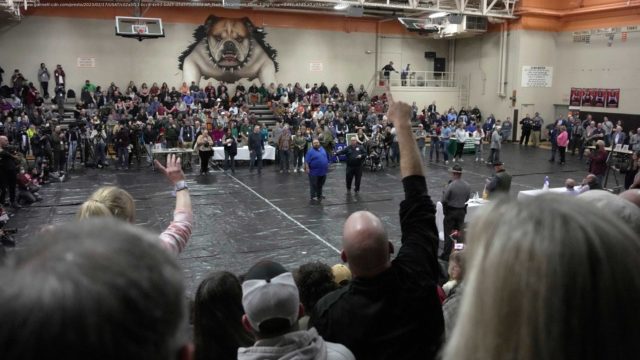Array
On today’s episode of the 5 Things podcast: Ohio residents want answers after toxic train derailment
Cincinnati Enquirer Health Reporter Brooks Sutherland gives a scene report from Ohio after a train derailment and toxic chemical release. Plus, a Georgia grand jury recommends perjury charges in the Trump election interference probe, President Joe Biden confirms that objects shot down by the U.S. last week were not likely spy balloons, USA TODAY Trending Reporter Wyatte Grantham-Philips talks about why the ‚Doomsday Glacier‘ is in trouble, and Bruce Willis has been diagnosed with dementia.
Podcasts:True crime, in-depth interviews and more USA TODAY podcasts right here.
Hit play on the player above to hear the podcast and follow along with the transcript below. This transcript was automatically generated, and then edited for clarity in its current form. There may be some differences between the audio and the text.
Taylor Wilson:
Good morning. I’m Taylor Wilson and this is 5 Things you need to know Friday, the 17th of February 2023. Today, where things stand two weeks after the Ohio train derailment. Plus, we know more about those unidentified flying objects the US shot down, and the Doomsday Glacier is in trouble.
♦
Today marks two weeks since the massive train derailment in Ohio, and the release of toxic chemicals that followed. For an update on where things stand, and how residents in the area feel about the situation, I spoke with Cincinnati Enquirer Health Reporter Brooks Sutherland. Brooks, thanks for hopping on the podcast.
Brooks Sutherland:
Hey, thanks so much for having me. Appreciate it.
Taylor Wilson:
It’s been two weeks since the massive train derailment in Ohio where officials subsequently burned off the toxic chemicals that were on board to prevent a massive explosion. So Brooks, walk us through what we know now two weeks later.
Brooks Sutherland:
So we know that obviously a train derailment, an axle issue caused this on February the third. A couple of days later, officials deemed that there needed to be a controlled burn to essentially avoid what they called that explosion in the area. They evacuated residents to do that controlled burn. They brought them back. They have since told these folks that it’s safe to get back to allow the normal things, but certainly residents are concerned about the lingering health effects that may come from an exposure like this, and are a little bit mistrusting of fully returning to normal life.
Taylor Wilson:
Brooks, there was a town hall in East Palestine, Ohio. This is the village that has experienced the worst of the disaster. So what happened at this meeting?
Brooks Sutherland:
This was billed as a town hall initially. When we got there, the folks that have it set up said it’s going to be more of an informational meeting, set up like a job fair almost, where residents could walk around and get information from the different agencies that were there. They invited the Environmental Protection Agency, they invited Norfolk and Southern. When we got there, the mayor informed media first and then told residents that Norfolk and Southern would not be at the meeting. And that obviously caused residents to be a little bit… It was a little tense, they were a little bit angry about that fact. And what ultimately happened was the mayor took questions from residents. You can imagine that they have a lot of concerns. They’re very upset at what they perceive as a lack of transparency. But the mayor and the Ohio Department of Health Director, Dr. Bruce Vanderhoff, was there. And folks from the EPA just trying to answer some of the questions and concerns.
Taylor Wilson:
Yeah, you mentioned Norfolk and Southern, the president and CEO issued an open letter to East Palestine residents this week. What did the letter say? And did it succeed at all in making residents feel any safer?
Brooks Sutherland:
So the letter essentially said, „Look, we hear you. We hear that you have some concerns.“ The letter I think emphasized a couple of times that I think it said directly, „We will not walk away from East Palestine.“ I can tell you just from being there last night and talking to people, residents of East Palestine, outside as they’re waiting – which by the way, hundreds of people, quite a showing for something like this.
Start
United States
USA — Events Ohio residents question toxic train derailment, 'Doomsday Glacier' in trouble: 5 Things...






